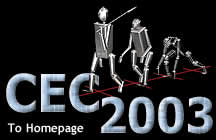
Swarm Intelligence and its applications
Congress on Evolutionary Computation, Canberra, Australia, 8th - 12th December 2003
Organizers:
Dr
Xiaodong Li
School of Computer Science and Information Technology
RMIT University, VIC 3001
Melbourne, Australia
Phone: +61 3 99259585
Dr
Gao Liang & Dr
Gao Haibing
School of Mechanical Science & Engineering, Huazhong
University of Science & Technology,
Wuhan, China, 430074
Tel: 862787556924
Fax: 862787543074
Call for paper (PDF)

 Swarm Intelligence is an AI
technique that focuses on studying the collective behaviour of a
decentralised system made up by a population of simple agents interacting
locally with each other and with the environment. Although there is
typically no centralised control dictating the behaviour of the agents,
local interactions among the agents often cause a global pattern to
emerge. Examples of systems like this can be found abundant in nature,
including ant colonies, bird flocking, animal herding, honey bees,
bacteria, and many more. This kind of "swarm-like" algorithm,
such as Ant Colony Optimization (ACO) and Particle Swarm Optimization (PSO),
have already been applied successfully to solve real-world optimization
problems in engineering and telecommunication. SI models have many
features in common with Evolutionary Algorithms. Like EA, SI models are
population-based. The system is initialised with a population of
individuals (i.e., potential solutions). These individuals are then
manipulated over many generations by ways of mimicking social behaviour of
insects or animals, in an effort to find the optima. Unlike EA, SI models
do not use evolutionary operators such as crossover and mutation. A
potential solution simply "flies" through the search space by
modifying itself according to its relationship with other individuals in
the population and the environment.
Swarm Intelligence is an AI
technique that focuses on studying the collective behaviour of a
decentralised system made up by a population of simple agents interacting
locally with each other and with the environment. Although there is
typically no centralised control dictating the behaviour of the agents,
local interactions among the agents often cause a global pattern to
emerge. Examples of systems like this can be found abundant in nature,
including ant colonies, bird flocking, animal herding, honey bees,
bacteria, and many more. This kind of "swarm-like" algorithm,
such as Ant Colony Optimization (ACO) and Particle Swarm Optimization (PSO),
have already been applied successfully to solve real-world optimization
problems in engineering and telecommunication. SI models have many
features in common with Evolutionary Algorithms. Like EA, SI models are
population-based. The system is initialised with a population of
individuals (i.e., potential solutions). These individuals are then
manipulated over many generations by ways of mimicking social behaviour of
insects or animals, in an effort to find the optima. Unlike EA, SI models
do not use evolutionary operators such as crossover and mutation. A
potential solution simply "flies" through the search space by
modifying itself according to its relationship with other individuals in
the population and the environment.
This special session will highlight the latest development in this rapidly growing research area of Swarm Intelligence. Authors are invited to submit their original and unpublished work in the areas including (but not limited to) the following:
- Particle swarm optimization
- Ant colony optimization
- Artificial life
- Culture algorithm
- Ecologically inspired models
- Other nature-inspired computation techniques
- Multi-objective optimization
- Constrained optimization
- Scheduling
- Real world applications
Papers should follow the formatting guidelines for CEC2003 regular papers, and should be submitted directly to the session organizers for review. A submission should not be over 8 pages. This includes all figures, tables, graphs, photos, and bibliography entries. Extra pages may be purchased at US$100 each. Special session papers are treated the same as regular conference papers, and will be included in the conference proceedings.
It is preferable that you email your submission in Adobe PDF format directly to the special session organizer xiaodong@cs.rmit.edu.au. DO NOT submit papers through the standard CEC2003 procedure. Please double check the as-printed appearance of your paper before sending it.
Organizers:
Dr Xiaodong LiSchool of Computer Science and Information Technology
RMIT University
GPO Box 2476v, VIC 3001, Melbourne, Australia
Phone: +61 3 99259585 Dr Gao Liang & Dr Gao Haibing
School of Mechanical Science & Engineering
Huazhong University of Science & Technology
Wuhan, China, 430074
Tel: 862787556924
Fax: 862787543074
James Kennedy (Indiana University Purdue University Indianapolis, USA)
Maurice Clerc (France Telecom, France)
Gerry Dozier (Auburn University, USA)
Anthony Carlisle (Huntingdon College, USA)
Jonathan Fieldsend (University of Exeter, UK)
Xiaohui Hu (Purdue University, USA)
Gao Liang (Huazhong University of Science & Technology, China)
Gao Haibing (Huazhong University of Science & Technology, China)
Hussein A. Abbass (ADFA, UNSW, Australia)
Marcus Randall (Bond University, Australia)
Konstantinos Parsopoulos (University of Patras, Greece)
Hiro Yoshida(University of Chicago,USA)
Hitoshi Iba(University of Tokyo,Japan)
Kazuhiro Saitou(University of Michigan,USA)
Carlos.Penha(Swiss Federal Institute of Technology,Switzerland)
Xiaodong Li (RMIT University, Australia)
Submission: June
23, 2003
Notification Acceptance: August 9, 2003
Camera-Ready: September 9, 2003
Conference: December 8-12, 2003